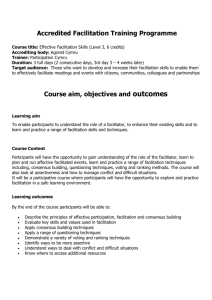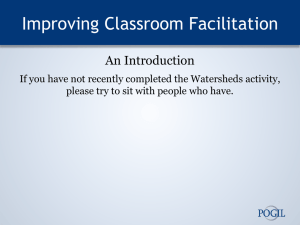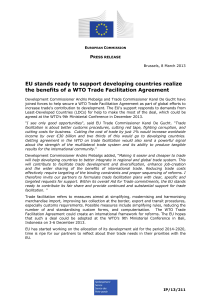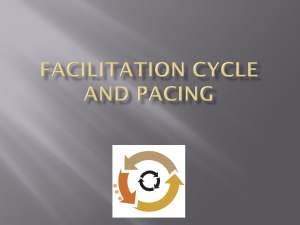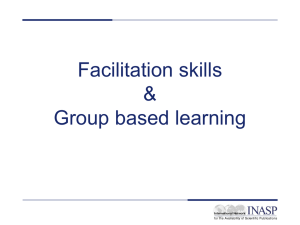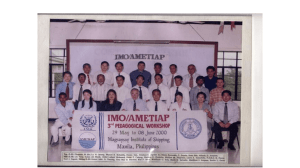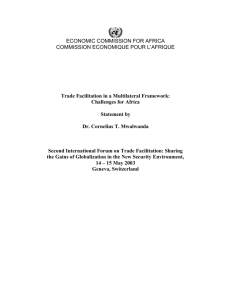trade facilitation from an african perspective * paper concept note
advertisement
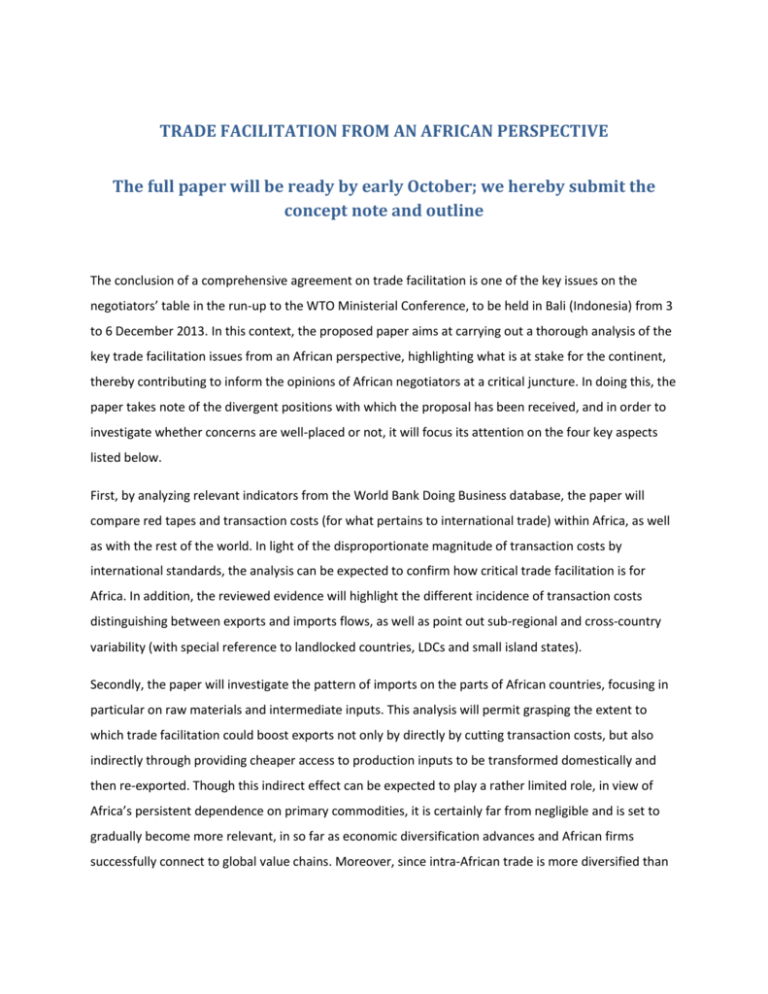
TRADE FACILITATION FROM AN AFRICAN PERSPECTIVE The full paper will be ready by early October; we hereby submit the concept note and outline The conclusion of a comprehensive agreement on trade facilitation is one of the key issues on the negotiators’ table in the run-up to the WTO Ministerial Conference, to be held in Bali (Indonesia) from 3 to 6 December 2013. In this context, the proposed paper aims at carrying out a thorough analysis of the key trade facilitation issues from an African perspective, highlighting what is at stake for the continent, thereby contributing to inform the opinions of African negotiators at a critical juncture. In doing this, the paper takes note of the divergent positions with which the proposal has been received, and in order to investigate whether concerns are well-placed or not, it will focus its attention on the four key aspects listed below. First, by analyzing relevant indicators from the World Bank Doing Business database, the paper will compare red tapes and transaction costs (for what pertains to international trade) within Africa, as well as with the rest of the world. In light of the disproportionate magnitude of transaction costs by international standards, the analysis can be expected to confirm how critical trade facilitation is for Africa. In addition, the reviewed evidence will highlight the different incidence of transaction costs distinguishing between exports and imports flows, as well as point out sub-regional and cross-country variability (with special reference to landlocked countries, LDCs and small island states). Secondly, the paper will investigate the pattern of imports on the parts of African countries, focusing in particular on raw materials and intermediate inputs. This analysis will permit grasping the extent to which trade facilitation could boost exports not only by directly by cutting transaction costs, but also indirectly through providing cheaper access to production inputs to be transformed domestically and then re-exported. Though this indirect effect can be expected to play a rather limited role, in view of Africa’s persistent dependence on primary commodities, it is certainly far from negligible and is set to gradually become more relevant, in so far as economic diversification advances and African firms successfully connect to global value chains. Moreover, since intra-African trade is more diversified than Africa’s trade with the rest of the world, it may be argued that trade facilitation will be particularly supportive of regional integration and of the emergence of regional value chains. Third, the paper will review the precise instruments discussed in the context of the proposal tabled by the WTO, and compare them with the instruments already agreed within Africa at the level of Regional Economic Communities as well as with legal provisions at the national level. This will allow assessing the consistency of the multilateral agenda with Africa’s regional integration agenda and national policies, while also identifying areas of potential synergies and complementarities between the three. It will also assess the potential synergies and complementarities between the WTO proposal and related multilateral conventions such as the Revised Kyoto Convention on the Simplification and Harmonization of Customs Procedures and the Customs Convention on the International Transport of Goods under Cover of TIR Carnets (TIR Convention). Finally, the paper intends to shed some light on the costs underlying trade facilitation activities. Adequately “costing the trade facilitation agenda” is not only crucial in relation to Africa’s need for development finance, but also in view of the fact that the modalities of the proposed trade facilitation agreement introduced a unique feature: the implementation of certain commitments is conditioned upon the delivery of technical and financial assistance. It will hence be critical to relate the estimated costs with the growing flow of resources channeled towards trade facilitation through the Aid for Trade Initiative. OUTLINE OF THE PAPER I. INTRODUCTION (500-750 words) Contextualization of the issue (Bali Conference, etc.), literature review, key objectives and structure of the paper II. TRADE COSTS IN AFRICA: WHY IS TRADE FACILITATION CRITICAL (2000-2500 words) Analysis of trade costs in Africa and the related competitiveness wedge at country level, distinguishing export and imports, and LLDC versus non LLDCs. III. TRADE FACILITATION AND AFRICA’S TRADE PATTERN (2000-2500 words) Analysis of African countries’ trade pattern (raw material, intermediate inputs and finished products) aiming at determining the extent to which trade facilitation could boost exports not only directly by cutting exports costs, but also indirectly through cheaper access to imported inputs and capital goods. IV. TRADE FACILITATION INSTRUMENTS: WTO, RECs AND NATIONAL (2000-2500 words) Comparative analysis of trade facilitation instruments considered in the context of WTO (the negotiating text for Bali), in the context of African RECs, and at national level. V. THE COST OF TRADE FACILIATION, SOME ORDERS OF MAGNITUDE (1500-1700 words) Broad assessment of the potential costs for Africa related to the trade facilitation agenda, and comparison with the dedicated Aid for Trade flows VI. CONCLUSIONS AND POLICY IMPLICATIONS (1000-1200 words)
